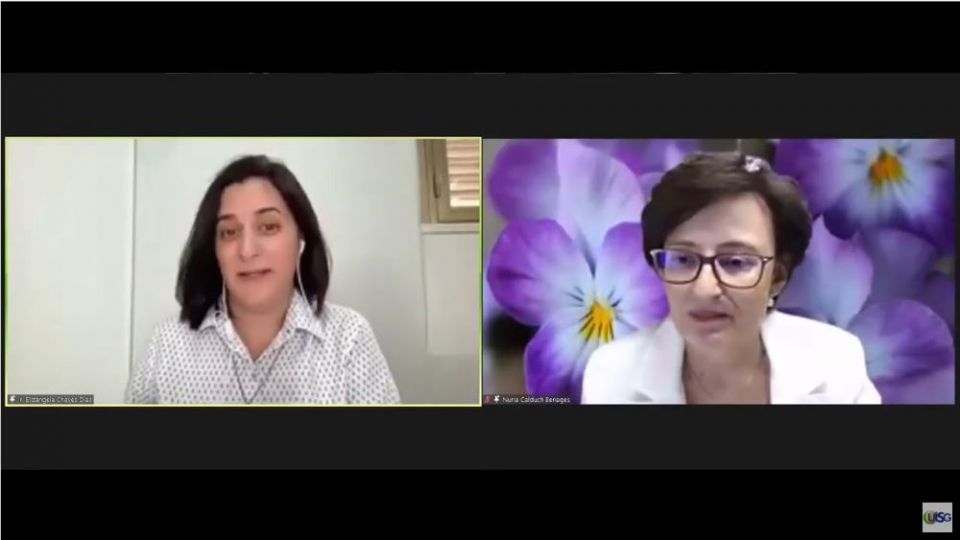11.1.21 GSR Monday Starter climate report.JPG
As COP26, the United Nations Climate Change Conference, gets underway in Glasgow, Scotland, seven Catholic sister congregations are among those to announce last week that they are divesting from fossil fuels in what faith-based groups said is the largest single divestment declaration.
The congregations joined the Catholic Bishops' Conference of Scotland as well as all eight Scottish archdioceses and dioceses in announcing their fossil-free commitment Oct. 26.
In all, 72 faith groups with more than $4.2 billion of combined assets declared their intention to divest from investments in the fossil fuel industry.
The sister congregations were: the Sisters of Charity of Australia; the Religious of the Assumption in the United Kingdom; the Daughters of Charity of St. Vincent de Paul's Province of Rosalie Rendu of Great Britain and Australia; Sisters of the Cross and Passion in the United Kingdom; the Columban Missionaries in Great Britain; the Daughters of the Holy Spirit's Province of England, Ireland and Wales; and the Benedictine Sisters of Erie, Pennsylvania.
Greek Catholic congregations also joined the action.
Advertisement
Advertisement
In a statement, Erie Benedictine Sr. Anne McCarthy, a board member of the biblical education institute Emmaus Ministries, said: "The movement to divest from fossil fuels aligns with the mission of Emmaus Ministries — to uphold the dignity of each human."
She added: "We can only uphold the dignity of all when we uphold the dignity of the earth where we live. Signing onto this movement is an effective way to enflesh our values and advocate at the societal level."
The statement noted that church leaders, including Pope Francis, as well as grassroots activists "have called for an immediate end to all fossil fuel finance." The announcement "shows an increasing number of Catholic institutions are responding to the recent Vatican recommendation to divest from fossil fuel companies and invest in climate solutions."
Activists hope the Oct. 31-Nov. 12 COP26 conference will establish new international targets for reducing harmful emissions caused by the burning and emission of fossil fuels.
11.1.21 GSR Monday Starter IMMIGRATION-MEXICo.JPG
Migration conference puts focus on refugees and theology
A recent virtual event brought together sisters and clerics, biblical scholars, and advocates for refugees and migrants to reflect on the current challenges of global migration through the lens of biblical experience.
The Sept. 20-22 event, the "Theology of Human Mobility in the 21st Century: Migrants and Pilgrims as Our Ancestors," took as a point of departure 1 Chronicles 29:15: "We are foreigners and strangers in your sight, as were all our ancestors."
Participants linked that reference to both the present and the biblical past. As event moderator Scalabrini Sr. Elizangela Chaves Dias said, the soul of Christian theological reflection is found in holy Scripture.
Dias is on the faculty of the Scalabrini International Migration Institute, an institute affiliated with the Pontifical Urbanian University of Rome that partnered with the International Union of Superiors General, or UISG, and the Union of Superiors General to sponsor the conference.
In an explanatory note, UISG noted on its website: "Migrations are more than movements of people from one place to another; they are related to cultural, social, political and religious transformations of people and nations, and to the continuous reshaping of communities."
As such, migration has always posed challenges for cultures, societies and faith traditions and continue to do so. Now, the United Nations' International Organization for Migration notes, there may be as many as 272 million migrants globally.
11.1.21 GSR Monday Starter_Dias and Calduch-Benages.jpg

In her Sept. 20 presentation, Sr. Nuria Calduch-Benages, a Missionary Daughter of the Holy Family of Nazareth and Spanish biblical scholar who is a professor of Old Testament at the Pontifical Gregorian University and a visiting professor at the Pontifical Biblical Institute, took note of the tradition that links the present day to the past, including the biblical past.
"Being a foreigner or a migrant is not an obstacle to receiving God's favor or protection," she said.
Calduch-Benages, also a member of the Pontifical Biblical Commission, said the New Testament affirms that Jesus from his earliest days "experienced what it meant to be a migrant."
But Calduch-Benages also noted that displacement and migration undergird the narratives of the Old Testament, or Hebrew Bible. The migration stories of Abraham; his two sons, Isaac and Jacob; and, of course, Moses are replete with the realities and hardships of displacement and migration.
Abraham's migration as leader of Israel is instructive, Calduch-Benages said, contrasting it with that of another ancient figure, Homer's Ulysses.
While Ulysses' journey in "The Odyssey" is ultimately about a man returning to his home, Abraham's was a "journey without return" — the journey of an exile. Abraham was a "nomad" who had to put his full faith in God, Calduch-Benages said.
Similarly, she said, the tens of millions displaced because of economic pressures, wars and climate change also face an uncertain future and constantly put their faith in God amid considerable challenges and hardships.
"They are seeking peace, bread, a future for their children," Calduch-Benages said.
Calls from Pope Francis and others in the church to welcome and defend migrants, refugees and the newly arrived are rooted in these ancient narratives, she said, and the hospitality the church and its institutions show are examples of a tradition of loving fraternity and care, of "merciful welcome."
A reading of biblical texts can speak "to our world today," Calduch-Benages said, "to an ongoing call for providence and open space to the faith and hope and the spreading of solidarity and action."
In remarks Sept. 22, Sr. Jolanta Kafka, general superior of the Claretian Missionary Sisters and president of UISG, reaffirmed the thread of migration in the Judeo-Christian tradition, recalling the experiences of Abraham and Jesus in particular.
"We all come to life, to faith, to vocation from the migration experience," she said. Perhaps this awareness is one reason those in consecrated life may feel a particular call to welcome migrants and the most vulnerable, she added.
The tens of millions of people on the move "are our family, our neighbors, our friends," Kafka said, and they deserve the same respect, love and care as founders of faiths such as Abraham and Jesus.
The event can be viewed here.
Like what you're reading? Sign up for GSR e-newsletters!



